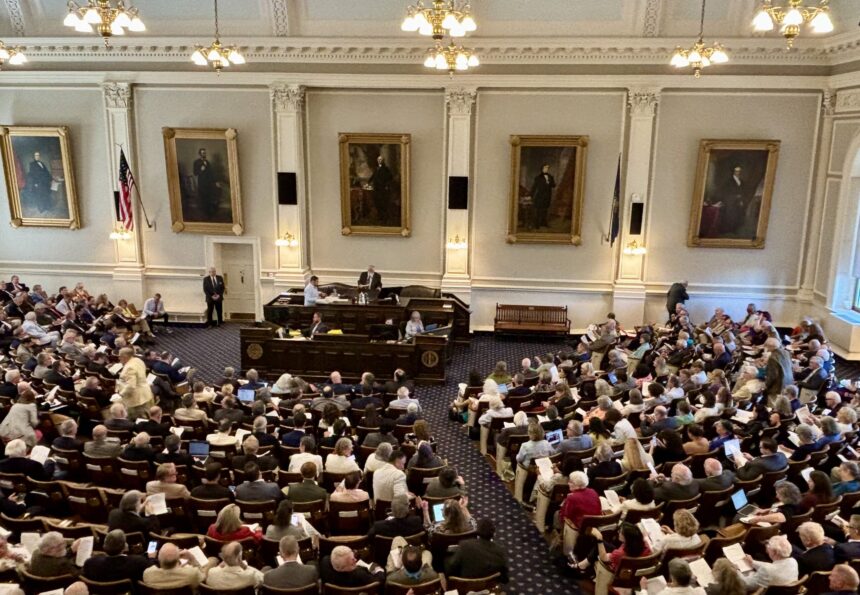This story was updated on June 13 at 5:24 p.m. to include comment from the ACLU of New Hampshire.
The New Hampshire House struck down a bill to legalize cannabis Thursday, in a dramatic end for a bill that exposed deep disagreements between the House and Senate.
Voting 178-173, the chamber rejected an attempted compromise with the Senate on House Bill 1633. That bill would have legalized the use of cannabis for anyone 21 and older starting in 2026, and would have allowed the creation of up to 15 retail locations overseen by the state.
But pro-legalization supporters in the House had opposed the retail approach endorsed by Gov. Chris Sununu and the Senate, and had been frustrated when the Senate continued to pass that version. The House voted to table the bill and then later adjourned for the summer, ending all chances that the bill could be revived.
Frustrations were high. “The perplexing thing about the immortality of this bill is that literally nobody in this body likes this bill,” said Rep. Jared Sullivan, a Bethlehem Democrat, just ahead of the vote.
Sununu had favored a franchise model that would allow businesses to buy licenses to run cannabis stores, but would give the state’s Liquor Commission top-down control over store layout and advertising.
Sununu said giving the state more control was important to establish safeguards for children and the general public. But pro-cannabis House members disagreed, arguing the franchise model would create an effective monopoly over sales that would squelch innovation. They pushed for a model that would allow retail licensees more freedom over stores.
The vote to kill the legislation was a notable political turn for the House. For more than a decade, bipartisan majorities of the House have passed cannabis legalization bills, only for bipartisan majorities of the Senate to reject them.
But in May 2023, that dynamic changed when Sununu – a longtime legalization opponent – announced he would sign a cannabis legalization bill that met certain exact criteria, which included tight state controls. The governor’s vow prompted a yearlong effort to cobble together a bill that could do that. But members of the House bristled at the governor’s retail model, and the two chambers had continued to clash in the weeks ahead of Thursday.
Last week, representatives from the House and Senate tried to insert compromises. The Senate agreed to increase cannabis industry representation on a cannabis control board – which would set regulations – after House negotiators complained they did not have a seat at the table.
Negotiators also added provisions that would make it easier for the state’s existing alternative treatment centers – which currently dispense medical marijuana – to obtain one of the licenses for retail cannabis.
And while the full legalization of cannabis would not have kicked off until 2026, the compromise bill would have immediately raised the decriminalization limits, allowing someone to possess up to an ounce of cannabis without facing criminal penalties. Currently, up to three-quarters of an ounce of cannabis is decriminalized in New Hampshire.
Rep. Erica Layon, the original sponsor of the bill, took to the floor to support the compromise bill. While the final package was not her ideal approach, she said, “We have the chance to get the ball rolling in New Hampshire.”
Layon argued that because the legalization in the final package did not kick in until 2026, lawmakers had a couple of years to tweak the rollout of the bill with future bills.
But on the House floor Thursday, other advocates for legalization said that the Senate-amended bill was a nonstarter.
To Sullivan, the creation of increased powers for the Liquor Commission would be unacceptable expansion of the state government.
“Does anyone in here actually believe that we will be able to reel in a newly empowered government bureaucracy after they’ve spent millions of dollars? Does anyone honestly believe it will be easy to pull back power from an unelected agency once they have it?”
Other advocacy groups took a different view. The American Civil Liberties Union of New Hampshire lamented the House’s vote Thursday, arguing that the body had thrown away a chance to pass legalization for all Granite Staters – regardless of the retail model used.
“Pushing legalization off yet another year makes clear that lawmakers are willing to ignore the will of their own constituents and are okay with continuing to needlessly ensnare over a thousand people – disproportionately Black people – in New Hampshire’s criminal justice system every year,” said ACLU Executive Director Devon Chaffee in a statement after the vote.
She added: “Marijuana legalization is not just a political squabble about the economic benefits – the war on marijuana has real-life impacts. While politicians argue, the impacts of these arrests will continue to ruin lives.”
Earlier in the day Thursday, HB 1633 had passed the Senate 14-10, with Republican Sens. Daryl Abbas of Salem, Dan Innis of Bradford, Tim Lang of Sanbornton, Keith Murphy of Manchester, and Howard Pearl of Loudon joining nine Democrats to support it. Manchester Democratic Sen. Lou D’Allesandro joined nine Republicans to oppose it.
On Wednesday, Sununu stopped short of vowing to sign the latest version of the bill, but defended his approach.
“You have billboards all over Massachusetts that tout marijuana, and how it’s easy access,” he told reporters. “You have locations in other states that are directly adjacent, in nearby schools, and I think that’s a huge problem.
“All of these are pieces that we tried to take into consideration if we were going to do it, develop the best system, not just in the region, but probably in the country.”












